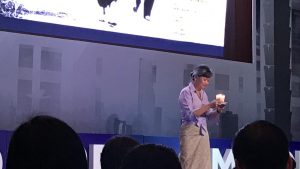Leadership
now browsing by category
How to fight back against a dictator, according to an exiled democracy activist
អ្នកស្រីម៉ូ សុខហួរមានប្រសាសន៍ “គាត់ឈ្នះទាំង១២៥កៅអីក្នុងរដ្ឋសភា” ហើយ “ឥឡូវនេះគឺជាការគ្រប់គ្រងឯកបក្សនៅក្នុងប្រទេសកម្ពុជា តែអ្វីដែលលោកហ៊ុន-សែនគ្មានគឺអំណាចស្របច្បាប់-ហើយយើងមិនមានគោលបំណងផ្តល់អោយហ៊ុន-សែននូវអំណាចស្របច្បាប់នោះទេ”។
Op-Ed: Quart
How to fight back against a dictator, according to an exiled democracy activist
When a country has a strongman for a ruler, an army at his disposal, and control of the media, how can the people fight back?
You go after the one thing he does not have: legitimacy.
That’s the strategy of the Cambodia National Rescue Party (CNRP), an opposition party banned for its threat to Asia’s longest-serving prime minister, Hun Sen, said Mu Sochua, one of its leaders in exile.
“We are not just opposition,” she said at the Oslo Freedom Forum yesterday (Nov. 10) in Taipei. “We are the hope of Cambodia.”
Ahead of Cambodia’s elections earlier this year—where the outcome was known well ahead—Hun Sen did what he could to pad his victory. He had the top court disband the CNRP, and jailed human-rights activists, journalists, and critics, including the opposition party’s leader Kem Sokha.
To delegitimize the rigged result, the CNRP started a “clean fingers” campaign urging voters to abstain from voting. Hun Sen’s Cambodian People’s Party responded by threatening voters whose fingers weren’t marked with indelible ink, used to signify a ballot was cast.
According to the National Election Commission, voter turnout for July’s general election was 80.5%, higher than the last general election in 2013, when turnout was 69.6%. The groups that monitored the elections were closely tied to Hun Sen, however, with one headed by one of his sons. Hun Sen is grooming his sons to take over in what will likely become, in essence, a hereditary dictatorship.
“He won all 125 seats in parliament,” Mu Sochua said. “It is now a one-party system in Cambodia, but what Mr. Hun Sen does not have—he does not have legitimacy, and we don’t intend to give Mr. Hun Sen legitimacy.”
Mu Sochua, once a member of Cambodia’s national assembly, had served as the minister of women’s and veterans’ affairs for Hun Sen’s government until she resigned in 2004. “I was proud to be a leader of the Cambodian women, but I was not proud to work for a government that was so corrupt,” she said.Because of Hun Sen’s stronghold on the armed forces and media, she said, it’s up to people outside the country to fight for reform. All over the world, overseas Cambodians are continuing the campaign to delegitimize Hun Sen.
“Whenever he goes outside Cambodia, he is met with protestors—Cambodians living abroad,” she noted.
Ahead of a trip to Australia in March, Hun Sen had warned Cambodian-Australians, who were planning to burn an effigy of him: “I will follow you all the way to your doorstep and beat you right there… I can use violence against you.”
But these threats aren’t deterring Mu Sochua, who believes international pressure is the most viable way to free Kem Sokha and bring change.
“We outside in exile or Cambodian workers in South Korea, Japan, people in France, everywhere—Mr. Hun Sen has a message from us: You are not the legitimate leader of Cambodia. We want real change,” she said.
Posted in Culture, Economics, Education, Internet, Leadership, Politics, Researches, Social | Comments Off on How to fight back against a dictator, according to an exiled democracy activist
Tags: Hun Sen illegitimacy
Hun Sen’s power paradox
Op-Ed: EastAsiaForum
Hun Sen’s power paradox
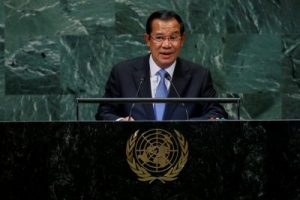
Cambodia’s Prime Minister Hun Sen addresses the 73rd session of the United Nations General Assembly at UN headquarters in New York, the United States, 28 September 2018 (Photo: Reuters/Eduardo Munoz).
Several concerning developments have emerged in 2018. Since the Supreme Court banned the main opposition party — the Cambodia National Rescue Party, or CNRP — in November 2017, Hun Sen has further consolidated his power by appointing family members to top government positions.
Some of these promotions were of his children. For instance, in late 2017 Hun Sen appointed his third son, Hun Manith, as General Director of the General Directorate of Intelligence, a new intelligence unit designed to train spies for combat against terrorists and any suspected threat from ‘revolutionary’ forces. Hun Sen also promoted his son-in-law, Dy Vichea — former head of the Ministry of Interior’s Central Security Department — to Deputy Chief of the National Police. Most importantly, Hun Sen elevated his eldest son Lieutenant General Hun Manet as a General (four star) following his promotion to Deputy Commander in Chief of the Royal Cambodian Armed Forces (RCAF).
These tactical moves are part of the Prime Minister’s long-term strategy to consolidate power, which has been in place since he removed his then co-prime minister, Norodom Ranariddh, from power in July 1997. Hun Sen has used coercive means to tighten political control over state institutions and co-opt loyal followers. Hun Sen now maintains tight control over the judiciary and electoral processes at both the local and national level and his party, the Cambodian People Party (CPP), dominates the bicameral legislature.
Why has Hun Sen carried out these tactical moves? For some commentators, they are simply a part of Cambodia’s entrenched political culture of authoritarianism, nepotism and patrimonialism. While there is some truth to this way of looking at Cambodian politics, it overlooks Cambodian leaders’ deep sense of insecurity, which drives them to weaken opposition forces by all means necessary. Hun Sen has been comparatively more successful than past Cambodian leaders in consolidating power, and is continuing to expand his domination of Cambodian politics after more than three decades.
Despite this success, Hun Sen still appears to feel insecure. His efforts to fill top government positions with family members are not simply about building a family business empire but rather about shutting down potential threats from within and without. This may explain why Hun Sen maintains a bodyguard unit of up to 6000 well-equipped and highly-paid troops.
Hun Sen’s sense of political vulnerability is also reflected in the words of Hun Manith, who reportedly said that the new General Directorate of Intelligence was designed to deal with ‘internal and external disturbance from a hostile and ill-intended group of people’ and that ‘the political and security situation and competition in the future will be more intense than in previous years’.
But Hun Sen is making the same mistake of the many Cambodian leaders before him: maximising political security by endlessly consolidating power. Hun Sen appears to believe that this strategy will continue to work for him. The problem with this strategy, though, may emerge from Cambodia’s external environment.
Hun Sen has taken advantage of the post-Cold War peace dividend and is also enjoying growing support from China. But he runs the risk of over-relying on Beijing’s support. The extent to which China is prepared to protect the CPP is difficult to determine, but what is clear is Chinese leaders’ long history of abandoning their allies when much was at stake. While Hun Sen may be aware of this possibility, his strategy to weaken domestic political challenges may increase his political insecurity.
Another problem with power consolidation through nepotism or patrimonialism is that it tends to invite resistance and opposition from both within the party and without. At some point, forces opposed to Hun Sen will grow stronger and nastier, especially if an economic downturn hits the country. And if Western democracies begin to impose sanctions on Cambodia, not only will ordinary Cambodians suffer, but the ruling elite will also face a legitimacy crisis. In this scenario, the CPP is likely to resort to even more repressive violence and may even end up self-imploding.
Current and future Cambodian leaders need to realise that security maximisation through unrestrained power consolidation is counterproductive and dangerous. Security does not necessarily result from others’ insecurity. But for this to happen would require CPP leaders to shift from a self-serving strategy to one that considers the security of others through effective dialogue and democratic power sharing.
Sorpong Peou is a Professor with the Department of Politics and Public Administration at Ryerson University, Toronto.
Posted in Culture, Economics, Education, Environment, Internet, Leadership, Politics, Researches, Social | Comments Off on Hun Sen’s power paradox
Tags: Cambodia authoritarianism, Hun Sen, Hun Sen at UNs
VOA facebook live on 27th Anniversary of the Paris Peace Agreement on Cambodia
Op-Ed: The CEROC
#VOAKhLive ក្នុងថ្ងៃគម្រប់ខួ
Posted in Economics, Education, Leadership, Politics, Researches, Social | Comments Off on VOA facebook live on 27th Anniversary of the Paris Peace Agreement on Cambodia
Tags: Paris Peace Agreement, PPA, PPA Commemoration
Public Statement on the Paris Peace Agreement of 27th Anniversary 23 October 2018
Op-Ed: The CEROC
COMMITTEE FOR ELECTION RIGHTS OF OVERSEAS
CAMBODIANS (THE CEROC)
Email: board@khmeroversea.info, www.khmeroversea.info
សេចក្តីថ្លែងការណ៍
គំរប់ខួប២៧ឆ្នាំនៃកិច្ចព្រមព្រៀងសន្តិភាពទីក្រុងប៉ារីស
សូមគោរពបងប្អូនជនរួមជាតិទាំងអស់ជាទីស្នេហា!
១. របត់ថយក្រោយនៃកិច្ចព្រមព្រៀងសន្តិភាពទីក្រុងប៉ារីសក្នុងរយៈពេល២៧ឆ្នាំ
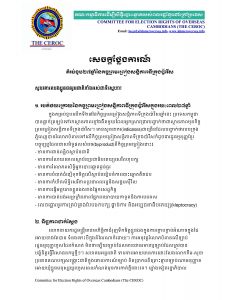 ក្នុងគម្រប់ខួបលើកទី២៧នៃកិច្ចព្រមព្រៀងសន្តិភាពទីក្រុងប៉ារីសឆ្នាំនេះ ប្រទេសកម្ពុជា បានធ្លាក់ត្រឡប់ទៅរកស្ថានភាពខ្មៅងងឹតមួយដែលអ្នកស្រាវជ្រាវបញ្ជាក់ថាជាស្ថានភាពមុនកិច្ចព្រមព្រៀងសន្តិភាពទីក្រុងប៉ារីស។ មានសូចនាករ(indicators)ជាច្រើនដែលបញ្ជាក់ថារបបក្រុង ភ្នំពេញបានរំលោភបំពានទៅលើកិច្ចព្រមព្រៀងសន្តិភាពទីក្រុងប៉ារីសក៏ដូចជារដ្ឋធម្មនុញ្ញខ្មែរ បច្ចុប្បន្នដែលជាសមិទ្ធផលសំរេច(byproduct)ពីកិច្ចព្រមព្រៀងនោះ៖
ក្នុងគម្រប់ខួបលើកទី២៧នៃកិច្ចព្រមព្រៀងសន្តិភាពទីក្រុងប៉ារីសឆ្នាំនេះ ប្រទេសកម្ពុជា បានធ្លាក់ត្រឡប់ទៅរកស្ថានភាពខ្មៅងងឹតមួយដែលអ្នកស្រាវជ្រាវបញ្ជាក់ថាជាស្ថានភាពមុនកិច្ចព្រមព្រៀងសន្តិភាពទីក្រុងប៉ារីស។ មានសូចនាករ(indicators)ជាច្រើនដែលបញ្ជាក់ថារបបក្រុង ភ្នំពេញបានរំលោភបំពានទៅលើកិច្ចព្រមព្រៀងសន្តិភាពទីក្រុងប៉ារីសក៏ដូចជារដ្ឋធម្មនុញ្ញខ្មែរ បច្ចុប្បន្នដែលជាសមិទ្ធផលសំរេច(byproduct)ពីកិច្ចព្រមព្រៀងនោះ៖
- មានការជាន់ពន្លិចស្ថាប័នជាតិ
-
មានការរំលាយចោលស្ថាប័នប្រជាធិបតេយ្យសេរីពហុបក្ស
-
មានការរំលោភពសិទ្ធិអ្នកបោះឆ្នោតឆ្ងន់ធ្ងរ
-
មានការបំបាត់ជំនឿទុកចិត្តលើស្ថាប័នរៀបចំការបោះឆ្នោតគឺគជប
-
មានការកំហិតសិទ្ធិសេរីភាពប្រជាពលរដ្ឋនិងសង្គមស៊ីវិល
-
មានការធ្វើអត្តឃាតខ្លួនឯងខាងផ្នែកសេដ្ឋកិច្ច
-
មានការបាត់បង់អព្យាក្រិតភាពផ្នែកនយោបាយកាទូតនិងការបរទេស
-
លេចធ្លោរនូវការគ្រប់គ្រងបែបឯកបក្ស ផ្តាច់ការ និងអប្បជនាធិបតេយ្យ(kleptocracy)
២. ទិដ្ឋភាពជាក់ស្តែង
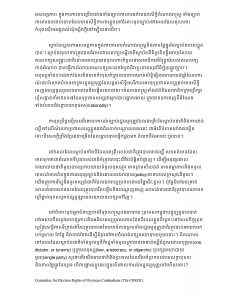 លោកនាយករដ្ឋមន្ត្រីមានមហិច្ឆិតាជំរុញទឹកចិត្តខ្លួនឯងក្នុងការក្តោបក្តាប់អំណាចក្នុងដៃអោយខាងតែបាន ទំនងទោះបីក្នុងតំលៃណាក៏ដោយ។ ការអនុវត្តរំលោភបំពានលើច្បាប់ រដ្ឋធម្មនុញ្ញហួសដែនកំណត់ មិនថាឡើយច្បាប់ដែលមានជាធរមានឬច្បាប់ដែលត្រូវបាន បង្ខំចិត្តធ្វើវិសោធនកម្មថ្មីៗ។ សហគមអន្តរជាតិ ទាមទារអោយមានការដោះលែងលោកកឹម-សុខា ប្រធានគណបក្សសង្គ្រោះជាតិក្នុងគោលការណ៍ច្បាប់ ពិតប្រាកដពីព្រោះគ្មានច្បាប់ណាអនុញ្ញាត អោយឃុំខ្លួនមនុស្សយូរហួសពេលកំណត់មុនការកាត់ក្តីនោះទេ។ ម្យ៉ាងទៀតរដ្ឋាភិបាល អសមត្ថភាព ក្នុងការការពារច្រើនយ៉ាងទាំងច្បាប់ការពារអភ័យឯកសិទ្ធិតំណាងរាស្ត្រ ទាំងច្បាប់ ការពារជនជាប់ចោទដែលមានសិទ្ធិការពារខ្លួននៅចំពោះមុខច្បាប់នៅពេលដែលតុលាការ កំពុងស៊ើបអង្កេតសំណុំរឿងក្តីនៅឡើយជាដើម។
លោកនាយករដ្ឋមន្ត្រីមានមហិច្ឆិតាជំរុញទឹកចិត្តខ្លួនឯងក្នុងការក្តោបក្តាប់អំណាចក្នុងដៃអោយខាងតែបាន ទំនងទោះបីក្នុងតំលៃណាក៏ដោយ។ ការអនុវត្តរំលោភបំពានលើច្បាប់ រដ្ឋធម្មនុញ្ញហួសដែនកំណត់ មិនថាឡើយច្បាប់ដែលមានជាធរមានឬច្បាប់ដែលត្រូវបាន បង្ខំចិត្តធ្វើវិសោធនកម្មថ្មីៗ។ សហគមអន្តរជាតិ ទាមទារអោយមានការដោះលែងលោកកឹម-សុខា ប្រធានគណបក្សសង្គ្រោះជាតិក្នុងគោលការណ៍ច្បាប់ ពិតប្រាកដពីព្រោះគ្មានច្បាប់ណាអនុញ្ញាត អោយឃុំខ្លួនមនុស្សយូរហួសពេលកំណត់មុនការកាត់ក្តីនោះទេ។ ម្យ៉ាងទៀតរដ្ឋាភិបាល អសមត្ថភាព ក្នុងការការពារច្រើនយ៉ាងទាំងច្បាប់ការពារអភ័យឯកសិទ្ធិតំណាងរាស្ត្រ ទាំងច្បាប់ ការពារជនជាប់ចោទដែលមានសិទ្ធិការពារខ្លួននៅចំពោះមុខច្បាប់នៅពេលដែលតុលាការ កំពុងស៊ើបអង្កេតសំណុំរឿងក្តីនៅឡើយជាដើម។
ស្ថាប័នរដ្ឋសភាអសមត្ថភាពក្នុងការការពារតំណាងរាស្ត្រនិងភាពថ្លៃថ្នូរនៃស្ថាប័នរបស់ខ្លួនបាន។ ស្ថាប័នតុលាការត្រូវបានគំរាមដោយពាក្យបណ្តឹងពីស្ថាប័ននីតិប្រតិបត្តិអោយរំលាយ គណបក្សសង្គ្រោះជាតិដោយមានប្រធានតុលាការកំពូលជាសមាជិកអចិន្ត្រៃយ៍របស់គណបក្ស កាន់អំណាច បានធ្វើការរំលាយគណបក្សនេះឆកល្វែងនិងខ្វះខាតសុភវិនិច្ឆ័យផ្លូវច្បាប់។ មនុស្សទាំង១១៨នាក់ដែលមិនមានកំហុសក៏ត្រូវបានហាមឃាត់សិទ្ធិធ្វើនយោបាយ៥ឆ្នាំដែលការណ៍នេះរំលោភបំពានមាត្រារដ្ឋធម្មនុញ្ញដែលផ្តល់សិទ្ធិសេរីភាពអោយប្រជាពលរដ្ឋគ្រប់មានសិទ្ធិ ពេញលេញចូលរួមនយោបាយនិងធ្វើនយោបាយ។តំណាងរាស្ត្រទាំង៥៥និងសមាជិកក្រុមប្រឹក្សាឃុំសង្កាត់ទាំង៥០០៧ដែលប្រជាពលរដ្ឋជាអ្នកបោះឆ្នោតអោយ ត្រូវបានដកចេញពីតំណែង ទាំងបំពាននិងគ្មានហេតុផល(irrationality)។
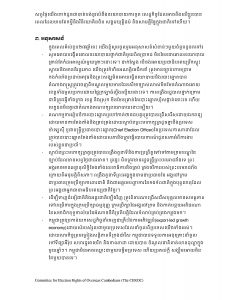 ការប្រព្រឹត្តល្មើសលើគោលការណ៍ច្បាប់រដ្ឋធម្មនុញ្ញដែលជាគ្រឹះនៃស្ថាប័នជាតិនិងការជាន់ ឈ្លីទៅលើសំលេងប្រជាពលរដ្ឋខ្លួនឯងជិតពាក់កណ្តាលនគរនេះ ជាអំពើបំពានយ៉ាងគឃ្លើន ទោះបីសេចក្តីប្រឹងប្រែងជាច្រើនដែលធ្លាប់បានធ្វើកន្លងមក ពិបាកនឹងអាចប៉ៈប៉ូវបាន។
ការប្រព្រឹត្តល្មើសលើគោលការណ៍ច្បាប់រដ្ឋធម្មនុញ្ញដែលជាគ្រឹះនៃស្ថាប័នជាតិនិងការជាន់ ឈ្លីទៅលើសំលេងប្រជាពលរដ្ឋខ្លួនឯងជិតពាក់កណ្តាលនគរនេះ ជាអំពើបំពានយ៉ាងគឃ្លើន ទោះបីសេចក្តីប្រឹងប្រែងជាច្រើនដែលធ្លាប់បានធ្វើកន្លងមក ពិបាកនឹងអាចប៉ៈប៉ូវបាន។
នៅពេលដែលស្ថាប័នទាំងបីដែលជាគ្រឹះរបស់ជាតិត្រូវបានជាន់ឈ្លឺ សារពត៌មានដែល ចាត់ទុកថាជាអំណាចទីបួនរបស់ជាតិក៏ត្រូវបានរុះរើនិងបំផ្លិចបំផ្លាញ។ ដើម្បីអនុវត្តគោល នយោបាយជាតិមួយបានប្រកបដោយទំនួលខុសត្រូវ មានក្រមសីលធម៌ មានតម្លាភាពនិងទទួល បានពត៌មានពិតក្នុងការអនុវត្តច្បាប់និងគោលនយោបាយ(policy)នានារបស់ក្រសួងនីមួយៗ យើងត្រូវការវិទ្យុនិងទូរទស្សន៍ជាតិដែលឯករាជ្យប្រកបដោយវិជ្ជាជីវៈខ្ពស់។ ប៉ុន្តែមិនមែនគ្រាន់ សារពត៌មានឯកជនទេដែលត្រូវបានរឹតបន្តឹងនិងបណ្តេញចេញ សារពត៌មានជាតិត្រូវបានយកមក ប្រើផ្តាច់មុខសម្រាប់ផ្សព្វផ្សាយនយោបាយបក្សទៅវិញ។
នៅចំពោះមុខអ្នកជំនាញខាងវិទ្យាសាស្ត្រនយោបាយ ប្រទេសកម្ពុជាបច្ចុប្បន្នបានបាត់ បង់អស់ហើយនូវឯករាជ្យភាពនិងអធិបតេយ្យបូរណភាពដែនដីរបស់ខ្លួនពីព្រោះនៅពេលកិច្ចព្រម ព្រៀងសន្តិភាពទីក្រុងប៉ារីសត្រូវបានគេរំលោភបំពានព្រមទាំងរដ្ឋធម្មនុញ្ញជាតិត្រូវបានគេយកមក បកស្រាយ កែច្នៃ និងចាត់ចែងដើម្បីតំរូវទៅតាមចំណង់បក្សនយោបាយមួយនោះ។ ពិតណាស់ នៅពេលដែលស្ថាប័នជាតិទាំងមូលឬនីតិរដ្ឋទាំងមូលត្រូវបានគេជាន់ឈ្លឺជំនួសដោយបុគ្គល(one, dictator, or tyranny) ឬក្រុមមនុស្ស(few, aristocracy, or oligarchy) ឬបក្សនយោបាយ មួយ(single party) សួរថាតើយើងមានជាតិនិងប្រទេសដែលរឹងមាំប្រកបដោយសក្តានុពល និងភាពថ្លៃថ្នូរដែរឬទេ បើការផ្លាស់ប្តូរនេះផ្ទុយពីគោលការណ៍រដ្ឋធម្មនុញ្ញទៅហើយនោះ? សព្វថ្ងៃយើងហាក់ដូចជាបាត់បង់នូវលំនឹងនយោបាយការទូត សេដ្ឋកិច្ចដែលអាចពឹងលើខ្លួនបាន ពេលដែលមានតែកម្ចីនិងវិនិយោគិនចិន សង្គមយុត្តិធម៌ និងសាមគ្គីផ្ទៃក្នុងជាតិទៅហើយ។
៣. អនុសាសន៍
ក្នុងពេលគំរប់ខួប២៧ឆ្នាំនេះ យើងខ្ញុំសូមចូលរួមអនុសាសន៍សំខាន់ៗមួយចំនួនដូចតទៅ៖
- សូមអោយបង្កើតគោលនយោបាយថ្នាក់ជាតិមួយពិតប្រាកដ មិនមែនជាគោលនយោបាយ គ្រាន់តែកំដរអារម្មណ៍មួយគ្រាៗនោះទេ។ ជាក់ស្តែង បើចង់អោយប្រជាធិបតេយ្យរីកស្គុះ ស្គាយនិងមាននិរន្តរភាព យើងត្រូវកំហិតអណត្តិមេដឹកនាំ ត្រូវមានច្បាប់ហាមប្រាម កងកំលាំងប្រដាប់អាវុធនិងព្រះសង្ឃមិនអោយធ្វើនយោបាយនិងបោះឆ្នោតបាន តំណាងរាស្ត្រត្រូវចេញពីមណ្ឌលមួយមានដែនសីមាច្បាស់លាស់មិនមែនតំណាងអោយ ខេត្តទាំងមូលប្រកបដោយផ្ទៃក្រឡាធំល្វឹងល្វើយនោះទេ។ ការពង្រឹងរដ្ឋបាលថ្នាក់ក្រោម ជាតិត្រូវធ្វើទាំងក្រុង ខេត្ត និងស្រុក មិនមែនគ្រាន់តែបោះឆ្នោតឃុំសង្កាត់នោះទេ ហើយ បេក្ខជនមិនគួរជាតំណាងគណបក្សនយោបាយនោះឡើយ។
- គណកម្មការរៀបចំការបោះឆ្នោតឬហៅកាត់ថាគជបគួរត្រូវបានជ្រើសរើសដោយឯករាជ្យដោយមានការតែងតាំងនិងគ្រប់គ្រងដោយស្ថាប័នព្រះមហាក្សត្រដូចគ្នានឹងប្រទេស ម៉ាឡេស៊ី ឬជាមន្ត្រីប្រធានបោះឆ្នោត(Chief Election Officer)នៃប្រទេសកាណាដាដែល ត្រូវបានបោះឆ្នោតតែងតាំងដោយសភានិងត្រូវធ្វើរបាយការណ៍ជូនសភាអំពីការងារ របស់ខ្លួនជាប្រចាំ។
- ស្ថាប័នព្រះមហាក្សត្រគួរត្រូវបានពង្រឹងតួនាទីនិងការប្រព្រឹត្តទៅទៅតាមក្រមខណ្ឌនៃ ច្បាប់ដែលមានសព្វថ្ងៃជាធរមាន។ ដូច្នេះ មិនត្រូវមានរដ្ឋមន្ត្រីព្រះបរមរាជវាំងទេ ព្រះ អង្គអាចមានឆន្ទានុសិទ្ធិតែងតាំងលេខាធិការនិងគ្រប់ គ្រងថវិការរបស់ព្រះបរមរាជវាំង ក្រោយពីអនុមត្តិពីសភា។ ពង្រឹងតួនាទីព្រះអង្គក្នុងនាមជាប្រធាននៃ អង្គចៅក្រម ជាប្រធានក្រុមប្រឹក្សាការពារជាតិ និងជាអគ្គមេបញ្ជាការនៃកងទ័ពជាតិក្នុងបុព្វហេតុដែល ព្រះអង្គជាអ្នកធានាអធិបតេយ្យជាតិខ្មែរ។
- ដើម្បីទាញជំនឿជាតិនិងអន្តរជាតិឡើងវិញ ត្រូវពិចារណាជ្រើសរើសបុគ្គលមានសមត្ថភាព ទៅបម្រើការក្នុងក្រុមប្រឹក្សាធម្មនុញ្ញ ក្រុមប្រឹក្សានៃអង្គចៅក្រម និងកាត់បន្ថយអតិផរណា នៃសមាជិកខុទ្ទកាល័យនៃអំណាចនីតិប្រតិបត្តិដែលទំលាប់គ្រប់គ្រងកន្លងមក។
- កម្ពុជាត្រូវប្រកាន់យកសេដ្ឋកិច្ចនាំចេញជាគ្រឹះនៃការអភិវឌ្ឍន៍(export-led growth economy)ដោយសំរបសំរួលជាមួយប្រទេសដែលនំាចូលពីប្រទេសយើងទាំងអស់។ ដោយសារកិច្ចព្រមព្រៀងសន្តិភាពទីក្រុងប៉ារីស កម្ពុជាបានទទួលការអនុគ្រោះនំាចូល ទៅទីផ្សាអឺរ៉ុប សហរដ្ឋអាមេរិក និងកាណាដា ដោយបាន ចំណូលជាតិពាន់លានដុល្លាក្នុង មួយឆ្នាំៗ។ កម្ពុជាមិនអាចឈ្លោះជាមួយបច្ចឹមប្រទេស ហើយប្រគល់ក្តី សង្ឃឹមអោយចិន តែមួយបានទេ។
៤. ដំណោះស្រាយបន្ទាន់ចំពោះមុខ
ដើម្បីស្តារស្ថានការណ៍ចំពោះមុខនាពេលបច្ចុប្បន្ន កម្ពុជាត្រូវអនុវត្តន៍តាមអនុសាសន៍ របស់សហគមអឺរ៉ុបជាកំហិត បើមិនដូច្នោះទេEBA ឬកូតាអនុគ្រោះពន្ធពិសេសនេះ នឹង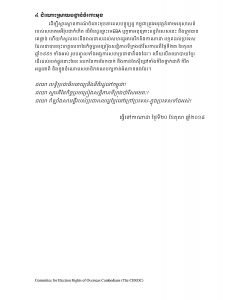 ត្រូវបាន គេផ្តាច់ ហើយកំសួលនេះនឹងរាលដាលដល់សហរដ្ឋអាមេរិកនិងកាណាដា រហូតដល់ប្រទេស ដែលជាបានចុះហត្ថលេខានៃកិច្ចព្រមព្រៀងសន្តិភាពទីក្រុងប៉ារីសកាលពីថ្ងៃទី២៣ ខែតុលា ឆ្នាំ១៩៩១ ទាំងអស់ រួមបញ្ចូលទាំងអង្គការសហប្រជាជាតិផងដែរ។ ហើយបើនយោបាយខ្មែរ ដើរដល់របត់ផ្លូវនោះមែន រលកនៃការបែកបាក់ នឹងកាន់តែស៊ីជ្រៅទាំងកំរិតថ្នាក់ជាតិ កំរិត អន្តរជាតិ និងក្នុងចំណោមសមាជិកគណបក្សកាន់អំណាចផងដែរ។
ត្រូវបាន គេផ្តាច់ ហើយកំសួលនេះនឹងរាលដាលដល់សហរដ្ឋអាមេរិកនិងកាណាដា រហូតដល់ប្រទេស ដែលជាបានចុះហត្ថលេខានៃកិច្ចព្រមព្រៀងសន្តិភាពទីក្រុងប៉ារីសកាលពីថ្ងៃទី២៣ ខែតុលា ឆ្នាំ១៩៩១ ទាំងអស់ រួមបញ្ចូលទាំងអង្គការសហប្រជាជាតិផងដែរ។ ហើយបើនយោបាយខ្មែរ ដើរដល់របត់ផ្លូវនោះមែន រលកនៃការបែកបាក់ នឹងកាន់តែស៊ីជ្រៅទាំងកំរិតថ្នាក់ជាតិ កំរិត អន្តរជាតិ និងក្នុងចំណោមសមាជិកគណបក្សកាន់អំណាចផងដែរ។
ជយោ លទ្ធិប្រជាធិបតេយ្យនិងនីតិរដ្ឋនៅកម្ពុជា!
ជយោ ស្មារតីនៃកិច្ចព្រមព្រៀងសន្តិភាពទីក្រុងប៉ារីសអមតៈ!
ជយោ កំឡាំងសាមគ្គីរបស់ប្រជាពលរដ្ឋខ្មែរនៅក្រៅប្រទេស-ក្នុងប្រទេសទាំងអស់!
ធ្វើនៅកាណាដា ថ្ងៃទី២០ ខែតុលា ឆ្នាំ២០១៨
Public Statement on the Paris Peace Agreement 23 October 2018
Posted in Culture, Economics, Education, KR Trial, Leadership, Politics, Researches, Social | Comments Off on Public Statement on the Paris Peace Agreement of 27th Anniversary 23 October 2018
Tags: Paris Peace Agreement, PPA












